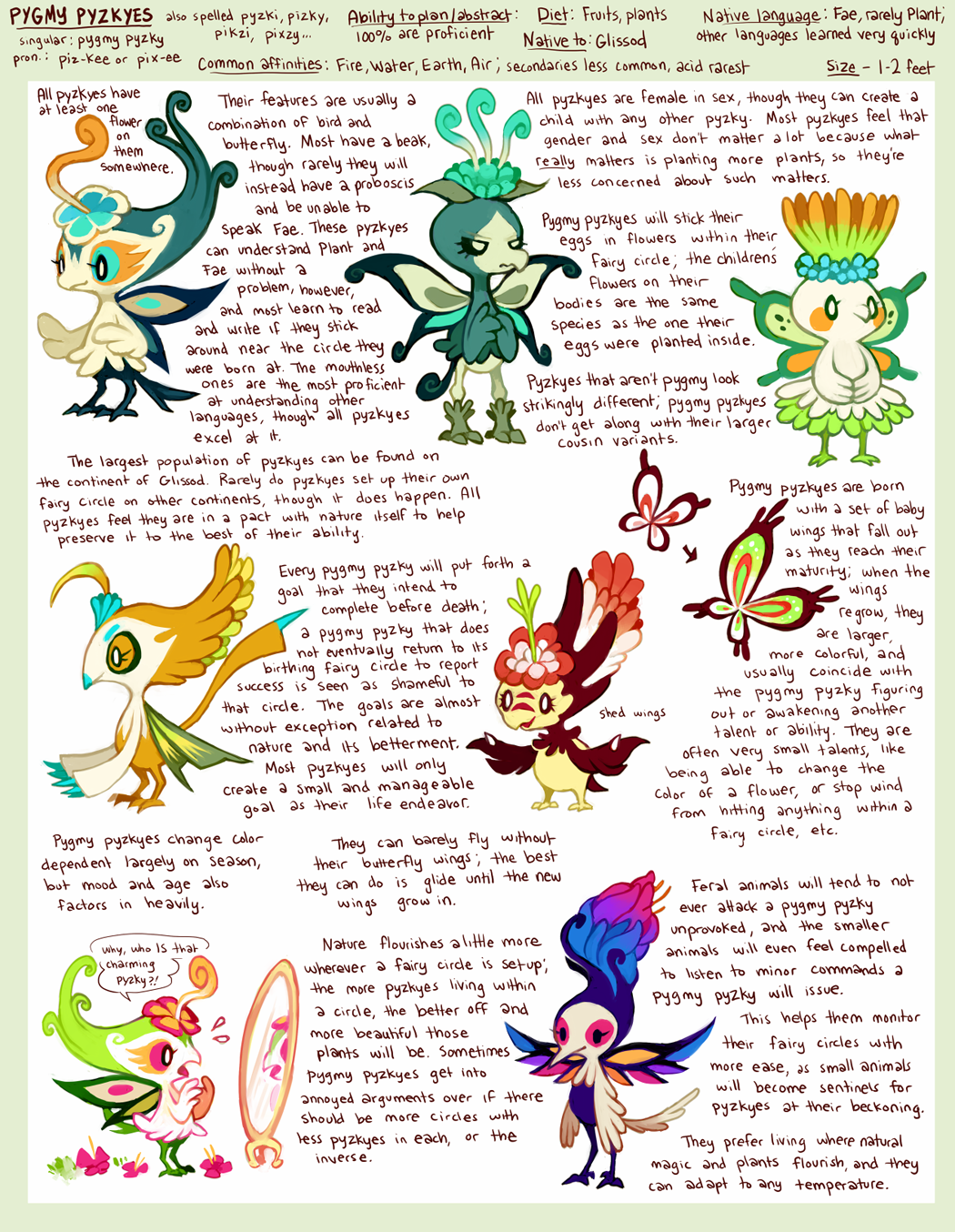Pygmy Pyzky

Common locations: Pygmy Pyzkyes are native to Glissod, and the vast majority of them will be found there, scattered throughout the continent. They are not a common sight on Owel, but the few that are found there usually live in areas far away from larger, industrialized cities. Places such as the Village of Good Intentions, Dewclaw Flats, Citrico Archipelago, Prospector Village, and United Gnoll Nations are examples of preferable Pyzky locations.
Climate preference: As long as magical affinity and plants are in abundance, the Pygmy Pyzkyes are usually happy to live there. Temperature and weather do not matter to Pyzkyes, as they are highly tolerant of and are able to naturally adapt to almost any temperature, save for hot or cold extremes. Sere Valley is one of the only places on Owel too hot for Pyzkyes to adapt to, and some of the furthest reaches of Auroria are too cold for Pyzkyes to adapt to.
Ability to Plan/Abstract: All Pygmy Pyzkyes are capable of higher-level thinking, such as the ability to plan ahead, to reason, rationalize, and to understand abstract concepts and principles.
Language: Pygmy Pyzkyes can almost always understand Fae, and a handful, mostly the ones born without a mouth, are able to understand Plant. Any language a Pygmy Pyzky does not know can often be learned relatively quickly.
Element
Common: Many Pyzkyes, not just the Pygmy versions, are highly in tune with nature, and primarily hold Earth, Fire, Water, or Air as one or more of their affinities. Generally speaking, the more diluted, or less “focused” an element is, the less chance there is of a Pygmy Pyzky with that element. As such, secondary elements are a bit more uncommon in Pyzkyes, with Spirit and its subtypes being second in rarity to Acid.
Hereditary magic: An equal amount of affinity from the parents and elemental influence from the environment affects the element of the Pyzky, with the flower the Pygmy Pyzky was born in often being the deciding factor in what affinity that offspring possesses. Primary elements often win out over secondary elements when determining the offspring’s affinity. No Pygmy Pyzkyes have ever been reported to be seen without an elemental affinity, so no comment can be made on that specific subject.
Elemental weaknesses/resistances:
Acid: Almost all Pygmy Pyzkyes are greatly negatively affected by Acid. It is able to corrode their defenses to other elements, and can often ruin the fairy circles Pyzkyes make, forcing them to relocate and make a new one elsewhere.
Others: Many Pygmy Pyzkyes are in tune with nature in some form or another, and possess varying resistances to almost all primary and secondary elements. The deciding factor for weaknesses or resistances often depends on the Pyzky itself, as well as its own individual affinities.
Trivia
-
Many believe that since traditional tales often depict fairies as fragile creatures, being weak to various metals, poisons, and fire, that Pygmy Pyzkyes are as well. This is an incorrect assumption, as many Pygmy Pyzkyes are actually resistant to those elements.
-
All known Pyzkyes are vegetarian, and Pyzkyes who have eaten meat, either on purpose or by mistake, almost always fall ill. Oftentimes this illness is so serious that the unfortunate Pyzky becomes bedridden for days on end.
-
The presence of Pygmy Pyzkyes encourages nature to thrive, with plants growing more quickly, animals becoming more abundant, and the weather becoming more docile. This also happens in lands without forests, lakes, or other things traditionally thought of when thinking of “nature”, although the effects are far more subtle. Pygmy Pyzkyes living in or near a volcano would see a greatly increased mineral content in the surrounding area’s soil, more gemstones forming, and nearby plants and animals acquiring the Fire or Lava affinity in order to more easily grow and live in that environment.
-
“Fairy circle” is the term for the area of nature-boosting effect around where Pygmy Pyzkyes establish their village or community.
See Also
- Original Post by Glip.





![[Beleth looking bored]](https://floraverse.com/static/images/global-title-foreground-left.png)

![[Andre looking proud of his graffiti]](https://floraverse.com/static/images/global-title-foreground-right.png)






